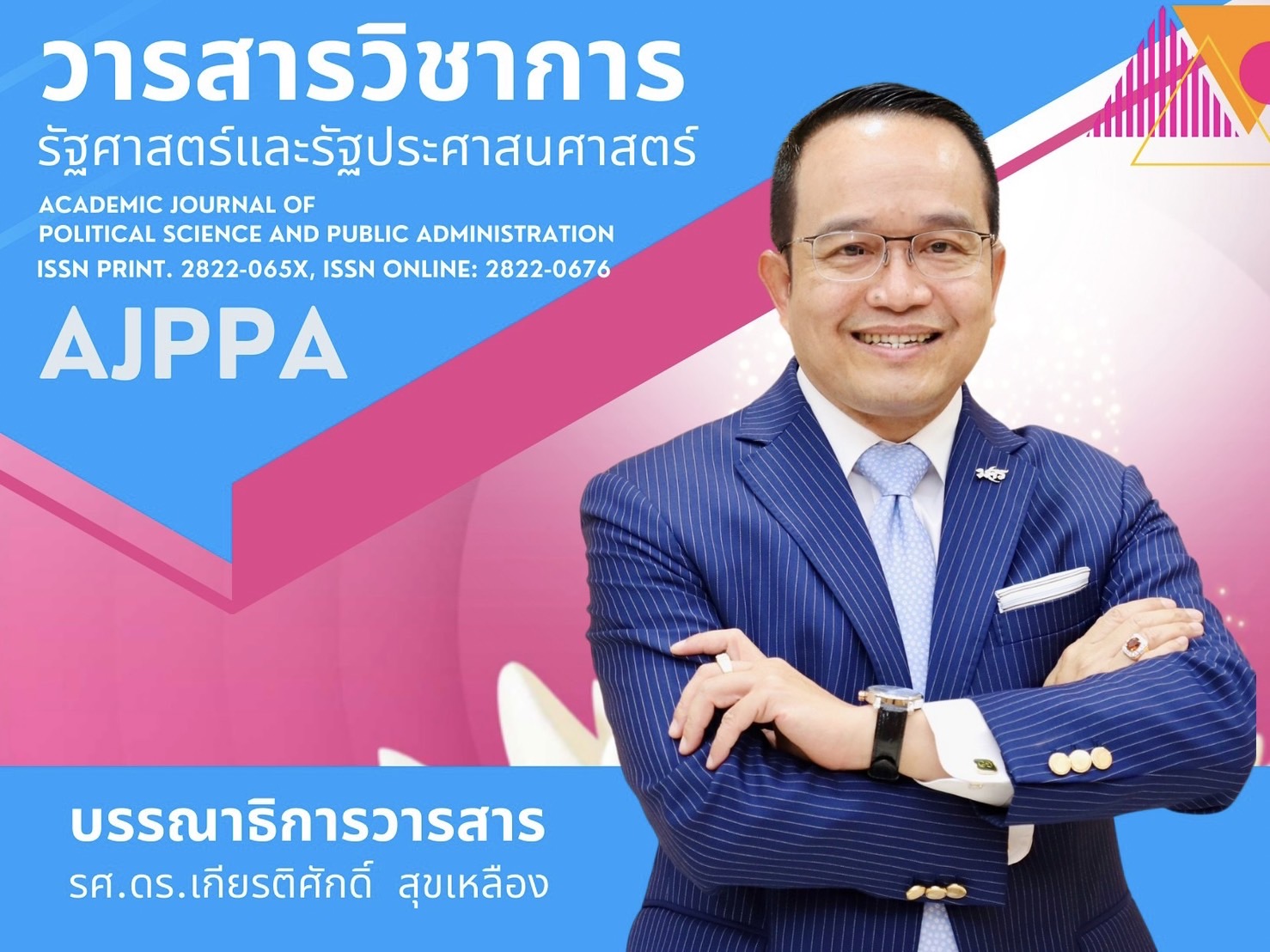การประยุกต์ใช้หลักสังคหวัตถุ 4 ในการส่งเสริมบทบาทของภาวะผู้นำทางการเมืองของนักการเมืองท้องถิ่น
คำสำคัญ:
นักการเมืองท้องถิ่น, ภาวะผู้นำทางการเมือง, สังคหวัตถุ 4บทคัดย่อ
นักการเมืองท้องถิ่น คือ บุคคลที่ประชาชนในท้องถิ่นนั้น ๆ ได้ตัดสินใจเลือกเข้าเป็นตัวแทนของท้องถิ่นในการทำงานประสานกับหน่วยงานของรัฐบาลกับประชาชน เพื่อพัฒนาท้องถิ่นของตน ดังนั้น นักการเมืองท้องถิ่นจำเป็นต้องมีภาวะผู้นำ ซึ่งหมายถึงความสามารถในการโน้มน้าวหรือชักจูงผู้อื่นให้ปฏิบัติตามแนวทางของตน โดยอาศัยทักษะ ความสามารถ และคุณลักษณะเฉพาะของผู้นำให้บรรลุเป้าหมายทางการเมืองที่ต้องการ เป็นผู้ที่มีจิตใจโอบอ้อมอารี และเสียสละ แสดงภาวะผู้นำต่อบุคลากรและประชาชนในท้องถิ่นด้วยความเอื้อเฟื้อเผื่อแผ่ มีความซื่อสัตย์มีคุณธรรม มีความโปร่งใส มีความเสมอภาคต่อทุกคน ไม่เบียดเบียน ไม่สร้างความเดือดร้อนให้แก่ผู้อื่น ดำรงตนตามหลักสังคหวัตถุ 4 ได้แก่ ทาน เสียสละช่วยเหลือผู้อื่น ปิยวาจา พูดจาไพเราะชวนให้ฟัง อัตถจริยา คำนึงถึงประโยชน์สุขของประชาชนเป็นสำคัญ สมานัตตตา วางตัวเสมอต้นเสมอปลาย ทำตนให้น่าเคารพนับถือ นำพาท้องถิ่นให้เกิดการประสานร่วมมือและอยู่ร่วมกันอย่างสงบสุข
เอกสารอ้างอิง
ชูวงศ์ ฉายะบุตร. (2539). การปกครองท้องถิ่น. กรุงเทพฯ: พริ้นติ้งเซ็นเตอร์.
ณัฐนรี ศรีทอง. (2552). การเพิ่มศักยภาพภาวะความเป็นผู้นำในงานพัฒนาชุมชน. กรุงเทพฯ: สำนักพิมพ์โอเดียนสโตร์.
บุบผา จานทอง. (2550). คุณลักษณะที่พึงประสงค์ของนายกองค์การบริหารส่วนตำบลในทัศนะของประชาชนผู้มีสิทธิเลือกตั้ง : ศึกษาเฉพาะกรณี ตำบลหน้าพระธาตุ อำเภอพนัสนิคมจังหวัดชลบุรี. ชลบุรี: มหาวิทยาลัยบูรพา.
พระธรรมปิฎก (ป.อ. ปยุตฺโต). (2546). ภาวะผู้นำ. (พิมพ์ครั้งที่ 7). กรุงเทพฯ: สุขภาพใจ.
พระประสิทธิ์ สุเขธิโต (บุญหนา). (2564). ภาวะผู้นำทางการเมืองของผู้นำท้องถิ่นในองค์การบริหารส่วนตำบลกุดน้ำใสอำเภอจัตุรัส จังหวัดชัยภูมิ. วารสารสถาบันวิจัยพิมลธรรม, 8(2), 67-79.
พระพรหมคุณาภรณ์ (ป.อ. ปยุตฺโต). (2550). ธรรมนูญชีวิต ฉบับชาวบ้าน. กรุงเทพฯ: สถาบันบันลือธรรม.
พระมหานพดล สีทอง. (2554). ความสัมพันธ์ระหว่างคุณธรรมด้านสังคหวัตถุ 4 และขันติ-โสรัจจะกับพฤติกรรมการเป็นสมาชิกที่ดีขององค์กรของบุคลากร : ศึกษาเฉพาะกรณีบุคลากรของสำนักนโยบายและยุทธศาสตร์ (วิทยานิพนธ์ ศิลปศาสตรมหาบัณฑิต สาขาวิชาจิตวิทยาอุตสาหกรรมและองค์การ). กรุงเทพฯ: มหาวิทยาลัยเทคโนโลยีพระจอมเกล้าพระนครเหนือ.
ลิขิต ธีรเวคิน. (2550). ความเป็นผู้นำทางการเมือง. สืบค้น 13 ธันวาคม 2566, จาก https://mgronline.com/daily/detail/9500000029811
วรยุทธ สถาปนาศุภกุล. (2560). คุณลักษณะผู้นําทางการเมืองท้องถิ่นที่พึงประสงค์ตามทัศนะของประชาชน อำเภอแม่ริม จังหวัดเชียงใหม่. วารสารสถาบันวิจัยญาณสังวร, 8(2), 245-253.
ศิริพร พงศ์ศรีโรจน์. (2540). องค์การและการจัดการ (พิมพ์ครั้งที่ 6). กรุงเทพฯ: ห้างหุ้นส่วนจำกัดเทคนิค 19.
สำนักงานคณะกรรมการการกระจายอำนาจให้แก่องค์กรปกครองส่วนท้องถิ่น. (2560). ความรู้เกี่ยวกับการกระจายอำนาจให้แก่องค์กรปกครองส่วนท้องถิ่นและสาระสำคัญที่เกี่ยวข้องกับประชาชน. กรุงเทพฯ: กระทรวงมหาดไทย.
สุเทพ พงศ์ศรีวัฒน์. (2550). ภาวะความเป็นผู้นำ. กรุงเทพฯ: ส.เอเซียเพรส (1989).
Bruce J. Cohen. (2009). Introduction to Sociology. New York: McGraw-Hill.
D. J. Role Levinson. (1971). Personality and social structure in the organization setting: Selected reading and projects in social psychology. New York Random House.
Easton, D. (2007). The Politic System: An Inquiry to the State of Political Science. Calcutta, India: Scientific Book.
McCormic, J. P. (2012). Machiavellian Democracy. New York: Cambridge University Press.
Redekop, J. (2003). Approaches to Canadian Politics. (2nd ed.). Ontario. Canada: Prentice Hall.
Stogdill, R. M. (1974). Handbook of Leadership. New York: Free Press.

ดาวน์โหลด
เผยแพร่แล้ว
รูปแบบการอ้างอิง
ฉบับ
ประเภทบทความ
หมวดหมู่
สัญญาอนุญาต
ลิขสิทธิ์ (c) 2024 วารสารวิชาการรัฐศาสตร์และรัฐประศาสนศาสตร์

อนุญาตภายใต้เงื่อนไข Creative Commons Attribution-NonCommercial-NoDerivatives 4.0 International License.




